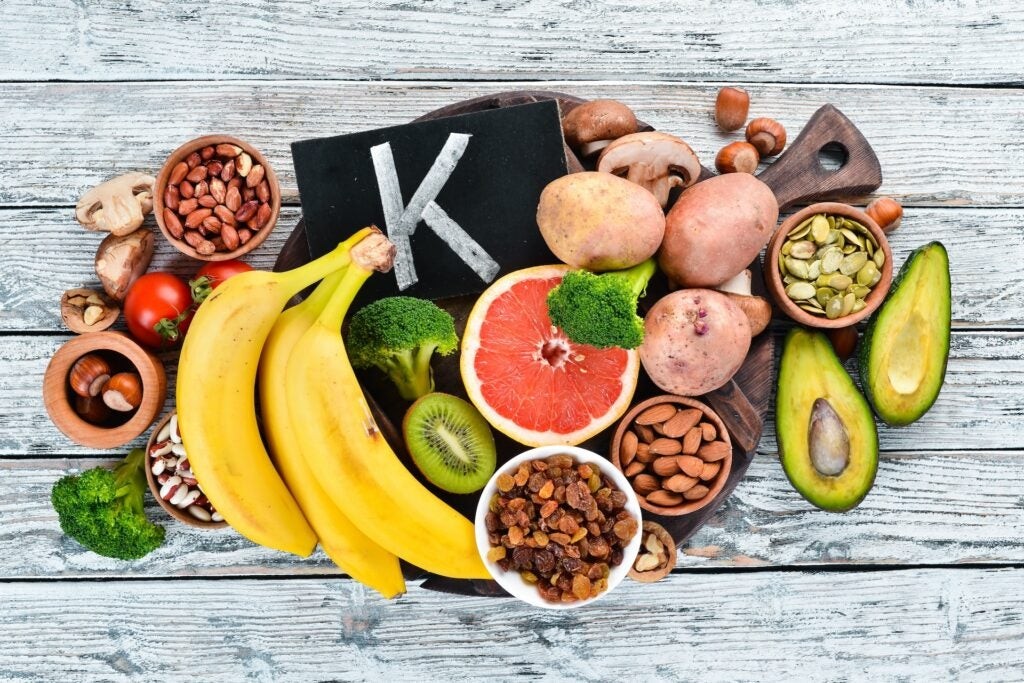Potassium is a vital mineral that plays an essential role in maintaining overall health. Often referred to as an electrolyte, potassium carries a small electrical charge that is crucial for various bodily functions, from nerve signaling to muscle contractions. Ensuring adequate potassium intake is key to supporting normal blood pressure, fluid balance, and even bone health. While potassium is readily available in numerous foods, many people may not be getting enough of this important nutrient. This guide will delve into the significance of potassium, highlight foods with lots of potassium, and provide a comprehensive list to help you boost your daily intake.
Why Potassium is Essential for Your Health
Potassium works closely with sodium to maintain fluid balance within your body’s cells. While sodium regulates fluid outside of cells, potassium is responsible for fluid inside. This delicate balance is crucial for cell function and overall hydration. Beyond fluid balance, potassium is integral to several other key bodily processes:
Key Roles of Potassium in the Body
- Blood Pressure Regulation: Potassium helps to relax blood vessel walls, which in turn can help lower blood pressure. This is particularly important in counteracting the effects of sodium, which can raise blood pressure.
- Muscle Function: Potassium is essential for muscle contractions, including the heart muscle. Adequate potassium levels ensure proper muscle function and prevent cramps and weakness.
- Nerve Signaling: Potassium aids in nerve impulses, which are crucial for transmitting messages between the brain and the body.
- Bone Health: Some studies suggest that potassium-rich foods may contribute to bone health by neutralizing acids in the body and reducing calcium loss.
Recommended Daily Intake of Potassium
While there isn’t a Recommended Dietary Allowance (RDA) for potassium, the National Academy of Medicine has established Adequate Intake (AI) levels:
- Women:
- 14-18 years: 2,300 mg daily
- 19+ years: 2,600 mg daily
- Pregnant and lactating women: 2,500-2,900 mg daily (depending on age)
- Men:
- 14-18 years: 3,000 mg daily
- 19+ years: 3,400 mg daily
Unfortunately, many adults do not meet these recommendations. The average daily potassium intake is estimated to be around 2,320 mg for women and 3,016 mg for men, highlighting a gap between recommended and actual intake.
Top Foods with Lots of Potassium: The List
Incorporating potassium-rich foods into your diet is a delicious and effective way to ensure you’re meeting your daily needs. Here is a list of foods with lots of potassium, categorized for easy browsing:
Fruits:
- Bananas: Perhaps the most well-known potassium source, a medium banana provides around 422 mg of potassium.
- Avocado: Half an avocado packs approximately 485 mg of potassium, along with healthy fats and fiber.
- Cantaloupe: A cup of cantaloupe offers about 427 mg of potassium and is also hydrating due to its high water content.
- Oranges and Orange Juice: One orange contains roughly 237 mg of potassium, and a cup of orange juice boasts even more.
- Dried Fruits: Dried apricots and raisins are concentrated sources of potassium. A half cup of dried apricots can offer over 750 mg of potassium.
- Coconut Water: This natural electrolyte drink is a good source of potassium, offering around 600 mg per cup.
Vegetables:
- Potatoes: A medium baked potato, especially with the skin, is loaded with potassium, providing over 900 mg. Sweet potatoes are also excellent sources.
- Spinach: Cooked spinach is a nutritional powerhouse, delivering over 800 mg of potassium per cup.
- Broccoli: One cup of cooked broccoli contains over 450 mg of potassium, in addition to other vitamins and minerals.
- Beet Greens: Similar to spinach, beet greens are rich in potassium, offering a substantial amount per cooked serving.
- Winter Squash: Acorn and butternut squash are great sources, with butternut squash providing nearly 600 mg of potassium per cup (cooked).
- Tomatoes: Tomatoes and tomato products like sauce and paste contribute to potassium intake.
Legumes:
- Beans: Kidney beans, white beans, and lima beans are all excellent sources of potassium. A cup of cooked white beans can contain over 1,000 mg of potassium.
- Lentils: Lentils are not only a great source of protein and fiber but also provide a good amount of potassium.
Dairy and Plant-Based Milks:
- Milk and Yogurt: Dairy products like milk and yogurt are good sources of potassium and calcium. Yogurt, in particular, can offer a significant amount.
- Soy and Almond Milk: Plant-based milk alternatives like soy and almond milk are often fortified with potassium and other nutrients.
Nuts and Seeds:
- Almonds and Cashews: These nuts contribute to your potassium intake, along with healthy fats and protein.
Other Sources:
- Chicken and Salmon: While not as high as fruits and vegetables, these protein sources do contribute to your overall potassium intake.
 Colorful display of potassium-rich foods including fruits and vegetables, showcasing options for a foods with lots of potassium list
Colorful display of potassium-rich foods including fruits and vegetables, showcasing options for a foods with lots of potassium list
Health Benefits of a Potassium-Rich Diet
Consuming foods with lots of potassium can have significant positive impacts on your health:
Cardiovascular Health and Blood Pressure
The interplay between potassium and sodium is crucial for cardiovascular health. High sodium intake is linked to increased blood pressure, while potassium helps to counteract this effect. Studies have shown that:
- Lower Cardiovascular Disease Risk: Research indicates that a higher potassium intake is associated with a lower risk of cardiovascular disease. Increasing potassium while reducing sodium is particularly beneficial.
- Blood Pressure Management: Potassium-rich diets, like the DASH (Dietary Approaches to Stop Hypertension) diet, have been proven effective in lowering blood pressure, especially in individuals with hypertension. Potassium can help relax blood vessels and promote sodium excretion, thus lowering blood pressure.
Bone Health
While calcium is widely recognized for bone health, potassium may also play a supportive role:
- Improved Bone Density: Some studies suggest that potassium-rich fruits and vegetables are linked to higher bone density. Potassium may help neutralize acids in the body that can lead to calcium loss from bones. However, more research is needed to fully understand this relationship, as other components in these foods may also contribute to bone health.
Kidney Stone Prevention
Potassium can also be beneficial in preventing kidney stones:
- Reduced Kidney Stone Risk: A higher potassium intake is associated with a lower risk of kidney stones. Potassium helps prevent calcium from being excreted in the urine, which is a key factor in kidney stone formation. Potassium citrate supplements are sometimes used to prevent recurrent kidney stones.
Potassium Deficiency (Hypokalemia) and Toxicity (Hyperkalemia)
Maintaining balanced potassium levels is essential. Both deficiency and excess can lead to health issues.
Potassium Deficiency: Hypokalemia
Hypokalemia, or potassium deficiency, is relatively rare in healthy individuals with a balanced diet but can occur due to:
- Excessive Fluid Loss: Vomiting, diarrhea, excessive sweating, and certain medications like diuretics can lead to potassium loss.
- Inadequate Intake Combined with Loss: While rare from diet alone, insufficient potassium intake combined with fluid loss can cause deficiency.
- Magnesium Deficiency: Magnesium is needed for the kidneys to regulate potassium levels, so magnesium deficiency can contribute to hypokalemia.
Symptoms of Hypokalemia:
- Fatigue
- Muscle cramps or weakness
- Constipation
- In severe cases: Muscle paralysis and irregular heart rate
Potassium Toxicity: Hyperkalemia
Hyperkalemia, or excess potassium, is also uncommon in healthy individuals with normal kidney function because the kidneys efficiently remove excess potassium. However, it can occur in:
- Kidney Disease: Impaired kidney function can lead to potassium buildup.
- Certain Medications: Some medications, including NSAIDs and potassium-sparing diuretics, can increase potassium levels.
- High Potassium Intake with Compromised Kidneys: Individuals with kidney issues should be cautious with high potassium diets and potassium-based salt substitutes.
Symptoms of Hyperkalemia:
- Weakness, fatigue
- Nausea, vomiting
- Shortness of breath
- Chest pain
- Heart palpitations, irregular heart rate
Incorporating More Foods with Lots of Potassium into Your Diet
Making simple dietary changes can significantly boost your potassium intake. Here are some practical tips:
- Prioritize Fruits and Vegetables: Aim to include a variety of fruits and vegetables in every meal and snack.
- Choose Potassium-Rich Options: Select from the list above when planning your meals and grocery shopping.
- Don’t Peel Potatoes: Eat potatoes with the skin on to maximize potassium intake.
- Include Legumes Regularly: Add beans and lentils to soups, salads, and main dishes.
- Stay Hydrated with Coconut Water: Opt for coconut water as a natural electrolyte drink after workouts or on hot days.
- Read Food Labels: Check food labels for potassium content and choose options that contribute to your daily needs.
By focusing on incorporating a variety of foods with lots of potassium into your daily diet, you can support your overall health and well-being. Remember to consult with a healthcare professional or registered dietitian for personalized dietary advice, especially if you have any underlying health conditions or concerns about potassium intake.
References
Last reviewed March 2023
Terms of Use
The contents of this website are for educational purposes and are not intended to offer personal medical advice. You should seek the advice of your physician or other qualified health provider with any questions you may have regarding a medical condition. Never disregard professional medical advice or delay in seeking it because of something you have read on this website. The Nutrition Source does not recommend or endorse any products.
